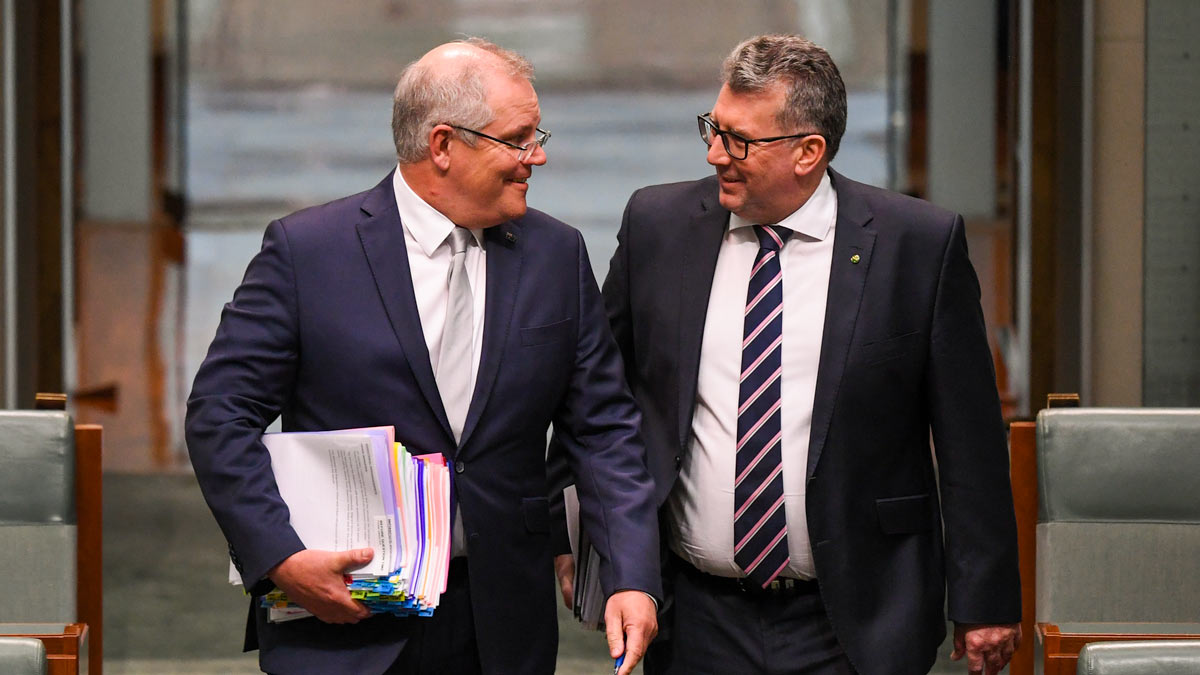The Russian invasion of Ukraine continues to send shockwaves through global energy markets – sending the price of oil, gas and coal to near all-time highs – but the Morrison government has done little to hide its glee at the increased earnings set to be gleaned by Australia’s fossil fuel industries.
With much of Europe and North America looking to sever ties with Russia, countries have been scrambling for replacement supplies of oil, gas and coal, and it has sent prices surging.
Consumers are bearing the brunt of higher energy prices, with petrol prices surging to unprecedented highs while rocketing coal and gas has seen Australian wholesale electricity futures up almost 30 per cent since the start of the year, also returning to near all-time highs.
The disruption caused by the conflict in Ukraine has contributed to surging global coal prices, exceeding US$450 per tonne (A$608) in some markets.
The price for coal from Newcastle for March delivery is still trading above US$330 per tonne (A$445), a record high. European oil prices are still currently trading above US$110 per barrel, prices not seen since 2014.
Much of the Asian gas market is pegged to the oil price, and so the region’s gas prices, including those in Australia, have followed oil higher.
But rather than being concerned about the consumer impacts of high price of fossil fuels, the Morrison government has welcomed it.
Federal resources minister Keith Pitt recently celebrated the high coal prices, which have boosted the earnings of Australian coal producers but have also contributed to a surge in Australian wholesale electricity prices.
“Total coal exports in the three months to January were $24.27 billion – a staggering 159 per cent increase on the same period a year earlier and 18 per cent above the earnings for the three months to October 2021,” Pitt said.
Such is the Morrison government’s desire to use the Ukraine conflict to ramp up Australia’s fossil fuel exports, Australia will even make a donation of coal to Ukraine, that prime minister Scott Morrison said will “power up their resistance”, but doubt remain around when and if it could actually be delivered.
There had initially been speculation that Australia had simply arranged for additional coal to be sent from a neighbouring country, like Poland, in an arrangement that would mirror those similar to Australia’s provision of arms and humanitarian assistance.
But, on Sunday, Scott Morrison made clear that the coal would be sent from Australia to a destination port somewhere in Ukraine.
“It’s our coal. We dug it up. We’ve arranged the ship. We’ve put it on the ship and we’re sending it there to Ukraine to help power up their resistance and to give that encouragement,” Morrison said during a press conference on Sunday.
“We understand that it can power up to about a million homes and this is incredibly important.”
The 70,000 tonnes of coal would be enough to fuel a medium-sized coal fired generator for around 3-5 days.
A spokesperson for Whitehaven coal confirmed that the cost of the coal, and its delivery, will be borne by the Australian government. At current prices that would be paying Whitehaven as much as $31 million for the donated coal, using taxpayer’s money.
The government will entrust the delivery of coal to commodities trading firm Trafigura.
“In a very tight global market where demand for our thermal coal remains very high, Whitehaven has managed to secure the extra supplies without impacting existing contracts to other international partners,” Pitt said in a statement.
“Liquefied natural gas reached similar heights, with $52.85 billion in total export earnings for the 12 months to January, up 52 per cent on the previous year.
“The $18.64 billion earnings for the three months to January was 134 per cent up on the same period last year.”
While increased earnings are great news for fossil fuel companies, and to some extent the federal budget, it is consumers who will be left with the burden of higher prices.
It’s not clear if or when the delivery of the coal may be made, given Russian warships are patrolling the Black Sea, with the passage of hundreds of ships being blocked.
Around one-third of Ukraine’s electricity generation was provided by coal-fired power stations before the conflict. Supplies have been tight, with much of the country’s coal mining industry located in the contested Donbas region.










